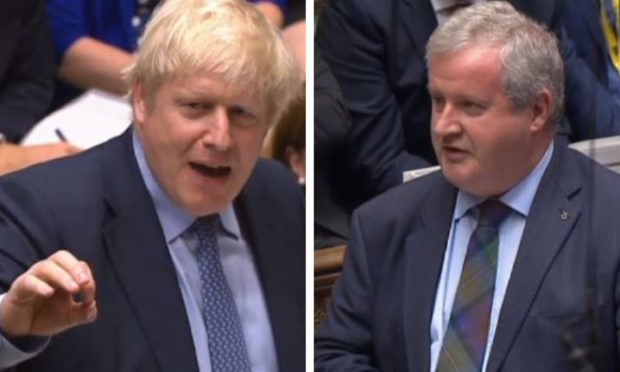As parliament was about to be prorogued on Monday night, it was ironically a Scottish Nationalist MP who voiced outrage, on behalf of opposition party leaders, at the threat to British democracy.
Ian Blackford, the SNP’s Westminster leader and self-appointed spokesman of the Rebel Alliance opposing a no deal Brexit, said the decision by Prime Minister Boris Johnson to close down the Commons for five weeks placed the country in a ‘constitutional crisis’.
As Blackford is a politician whose overriding goal is to provoke a constitutional crisis – by breaking up the United Kingdom – it was interesting to see where he was going as defender of that most Unionist of bodies, the Houses of Parliament.
‘It’s really important that the people of the United Kingdom know the harsh reality, that this is not parliament against the people, it’s the Prime Minister shutting down the democratic institutions of the United Kingdom,’ said Blackford.
It shows how confusing the political shambles has become when a Scottish separatist identifies his cause as that of the UK parliament and, by extension, the UK people.
In more normal times, Blackford is no friend of such a blatant bastion of Britishness, and typically he spends his working days trying to disrupt the parliament.
But his support now is to be welcomed (with caveats); the joining of opposition forces against the increasingly dictatorial government of Johnson has so far seen the PM’s ploy of a snap general election rejected – twice.
And it has resulted in an Act of Parliament that will delay our exit from Europe without a deal on October 31.
Such an effective consensus among the opposition parties has been absent throughout much of the years of Brexit politics and it is only desperation that pits unlikely allies together at last.
But to have any real chance of defeating Johnson – and the hardline Brexit process – in the longer term, opposition MPs must uphold their alliance in a general election, whenever that happens.
Current opinion polls are all over the place, but there is some agreement among them that the Conservatives would win an election, despite the mess they have created around Europe.
This is partly a reflection of voters’ massive mistrust of the Marxist Jeremy Corbyn and Labour’s own splits over the EU.
But the Tories’ election hopes are also boosted by the potential support of Nigel Farage. If the Brexit Party leader does a deal with Johnson, which is likely, by not fielding candidates in winnable Tory constituencies, the PM could triumph, polls suggest.
The opposition, then, must do the same. Following the scenes on Monday – when Blackford spoke of the ‘real focus of all of us’ against the prorogation of parliament – it was possible to believe in the strength of the alliance, if that is what it is, of opposition parties.
One can maybe see Lib Dems agreeing not to contest the seats of moderate Tory MPs or pro-Remain Labour members.
Across the country, politicians and public are divided, or united, by Europe, and other ideological differences could plausibly take a back seat if a general election were called while Brexit is ongoing.
Recently expelled Tory MPs, and those who have expelled themselves, like Amber Rudd, have much more in common with their Labour or Lib Dem opposite numbers than with Conservative colleagues who prize leaving Europe above preserving their party.
Where in this mix, though, does the SNP fit? In Scotland, there are no circumstances whereby even the most moderate Tories would want to form any kind of pact with the Nationalists over Europe. Ditto the Lib Dems and Labour.
The minority SNP government currently only succeeds in passing legislation with the backing of the pro-independence Greens.
For all other politicians north of the border, the independence question is more divisive than the Europe question is unifying.
What’s more, the SNP would fight to the death its opponents in the Unionist parties, whether in a general or a Scottish election – and why not? As things stand, the Nationalists are tipped to do well, and possibly wipe out all the Scottish Tory MPs in a Westminster ballot.
So, what is Blackford’s real motivation in trying to galvanise cross-party opposition in London? Obviously, inflicting damage on Boris Johnson plays well in Scotland.
And the SNP is officially anti-Brexit, although about one million Scottish Nationalists are estimated to be Leavers.
But we should never forget that his true motive is the destruction, sooner rather than later, of the UK.
It is therefore a bit rich of him to bleat about Johnson ‘seeking ways to undermine the will of parliament’; that is exactly what the SNP exists to do.
Blackford has risen to prominence in the current Westminster debacle because of a leadership vacuum on the opposition benches, but he is playing another game entirely. Let’s hope no one is fooled.


